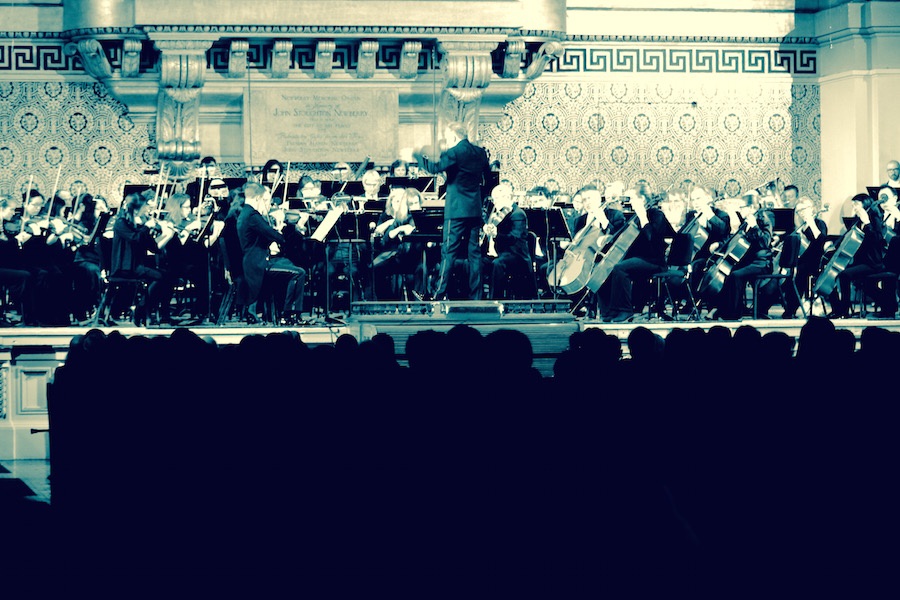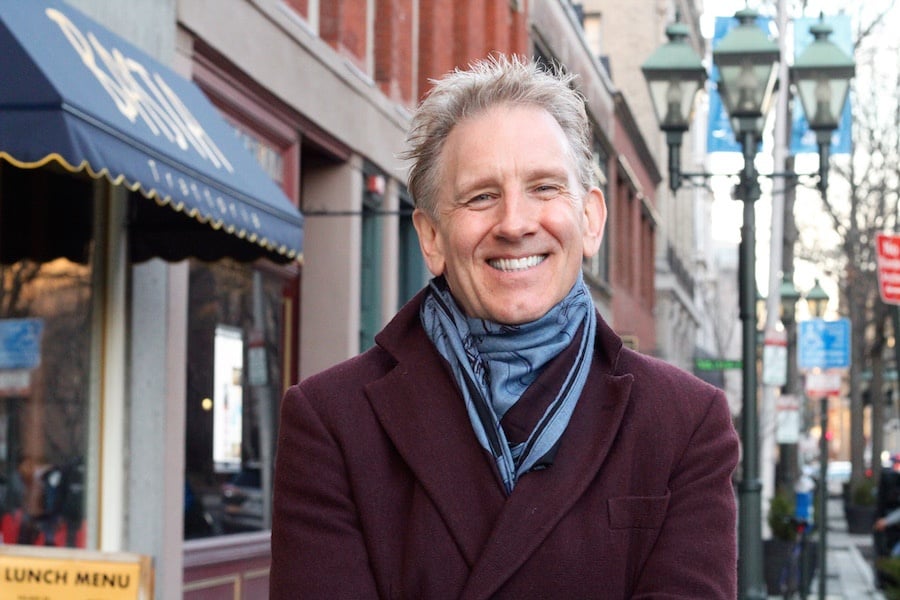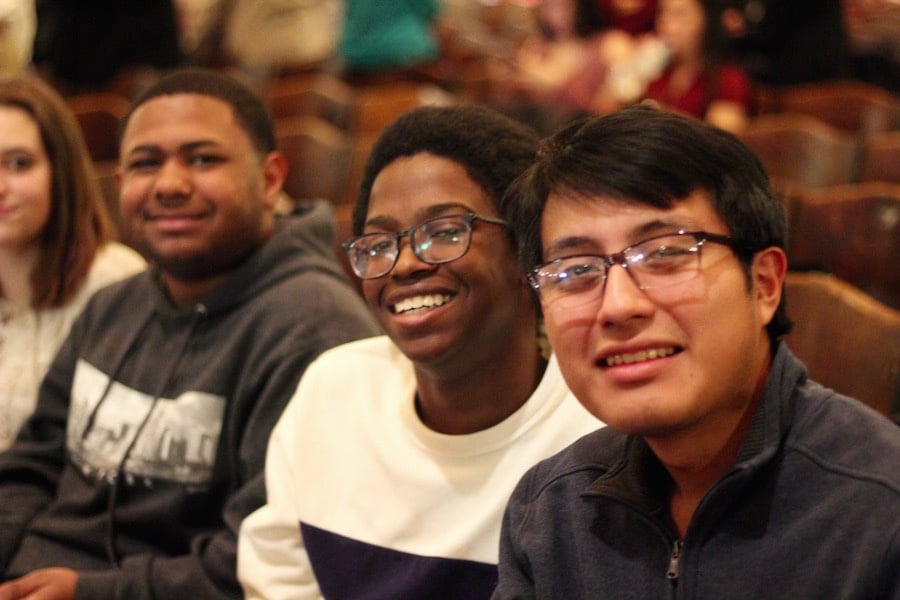 Thursday night, Neale returned to Woolsey Hall as the first of three finalists for music director at the New Haven Symphony Orchestra (NHSO). Music Haven students were there to be his most discerning critics. Lucy Gellman Photos.
Thursday night, Neale returned to Woolsey Hall as the first of three finalists for music director at the New Haven Symphony Orchestra (NHSO). Music Haven students were there to be his most discerning critics. Lucy Gellman Photos.Alasdair Neale expanded his wingspan, then contracted it with one shoulder pulled tightly in. He scrunched his butt and swung his hips back and forth. He raised his left hand and wagged his fingers one by one. With the sound of a pulsing heartbeat, the mothership lifted off the ground, and into the sky.
Thursday night, Neale returned to Woolsey Hall as the first of three finalists for music director at the New Haven Symphony Orchestra (NHSO), playing a program where new met old and East Coast met West. Around 200 came out for the event, the entirety of which found him balletic and enthralled on the stage, wrapped tightly in music from beginning to end.
“I want to say how incredibly thrilled and delighted I am to be back in New Haven this week,” he said before the concert. “I think you realize how much of a treasure you have in the musicians that I’m sharing the stage with tonight.”
Seated in row J, Music Haven students Robert Oakley and Isabel Melchinger watched the symphony warm up and get in position. Melchinger waded through her history homework (“I might as well get some work done on the Enlightenment”) as she waited for the concert to begin.
It was a different assignment, of the musical variety, that had brought her there. In the midst of learning an Elgar concerto for cello, she had jumped at the opportunity to hear the composer’s Variations on ‘Enigma’ when her teacher Philip Boulanger, who plays with the symphony, had suggested it. She said she hadn’t even looked at what else was on the program for the evening, because she is open to hearing anything.
.jpg) Isabel Melchinger and Robert Oakley.
Isabel Melchinger and Robert Oakley. “I don’t get a lot of opportunities to hear full, actual orchestras play,” she said. “At Music Haven we have this small orchestra, but it doesn’t really count. So I like hearing whatever it all comes together to be. I don’t really care what kind of music it is.”
Seated beside her, Oakley said he was a little more conflicted about a concert that dove head first into contemporary composition, something he’s never seen the symphony do. A self-described “seventeenth-century classical guy,” he expressed some skepticism around Mason Bates, the 41-year-old composer of Mothership.
“Contemporary really is just a new thing for me. It’s something I haven’t really experienced,” he said. He added that he already knows there’s great beauty in the canon, because he lives it as a violist—but he’s still not sure that the same applies to contemporary music.

But from the moment Bates’ Mothership broke over the crowd, Oakley was hooked, eyes widening as Neale left this realm, and entered a zero-gravity dimension of superhuman conducting. He stayed with the piece, a sort of orchestra meets electronica meets Tetris, as a burst of notes rose up to meet each other. He leaned forward as they braced for a sort of liftoff. At Woolsey, the symphony transformed into something other-worldly, the sounds of suction and machinery emanating from its depths.
An ambient, echoing beat came in, nearly in sync with a human heart as strings piled on top of it. Without a moment to lose, instruments kept a fast, suspense-flecked pace, ready for some galactic drama or spaceship repair at any given time. From the stage, foreign sounds flew in: alien-like gurgles and downbeats, shaking, hoof- and shaker-like interludes, all mixed with the familiar scream of brass, the singsong of oboes and clarinets. Oakley held onto his chair, unsure of whether he was still on College Street or somewhere else entirely.
As he conducted, Neale transformed into a fiery dancer-conductor, his body wire-like and malleable with the music. Ushering in a trill of chime-like notes, he raised his left arm and shook each finger individually, as though the fingers themselves might be making sound.
He sprang from his feet, legs parting as he landed a tiny jump. As Mothership lurched toward its ending, his back and shoulder formed a through line to his arm, a straight rod as it pointed to percussionist Doug Perry, and brought out a synthy, space-soaked sound.
In an interview with The Arts Paper earlier in the week, Neale had admitted to walking out of two or three ballets ”where I felt that the choreographer had wrecked the music in an unacceptable and disgraceful way.” He had laughed about it at the time. Now the approach, exacting and graceful, seemed to fit him like a glove.
 The Music Haven dream team: Melchinger, Noel Mitchell, Robert Oakley and Cris Zunun.
The Music Haven dream team: Melchinger, Noel Mitchell, Robert Oakley and Cris Zunun. "I love the conductor!,” said Oakley after the piece, waiting out intermission. “He’s so dramatic and extra and … it’s like watching me up there! It’s so good. It’s like actually watching the music come to life. It’s like the music embodied him, and he acted it out onstage while conducting at the same time.”
But it was Mozart’s Piano Concerto No. 20, featuring resident artist Michael Brown, that did it for fellow student Cristofer Zunun, who had slipped into a seat between Oakley and Melchinger just as the concert began.
For over 20 minutes, his eyes were glued to the center of the stage, where Brown mastered the piece’s sort of virtuosic call and response. Obscured partly by the piano, Neale turned from a sharp-edged, buoyant composer into a vehicle of grace itself, bending with each movement as if his joints were butter.
It wasn’t long before he had the orchestra physically swaying with him. From the understated “Allegro,” the piece grew throaty and romantic, swelling into the final Rondo with great gusto, and progressively frenetic layers of piano notes.
“The first time I heard it, I had never heard Mozart concertos in a minor key, and it was something captivating,” Zunun said, deeming it “the best” performance he had ever seen. “At first, I was like, I really didn’t like it, and … But it’s just captivating in a minor key. The syncopation—it lays out an eerie ambiance. And then the piano comes in.”
“She’s spice,” Oakley added. “She’s spicy.”
When asked “Who?” he grinned. “The concerto,” he said.
There was more spice in the second half, added Oakley. In his first moments back, Neale took the audience into a emotional, soaring rendition of Kevin Puts’ “…this noble company,” a kind of American Pomp & Circumstance (and a deep nod to Elgar) without any of the frills. A quiet endurance had overtaken him, kind but stern, warm and raw as he opened his arms to a burst of music.
Written almost 20 years ago in a time national strife—George Bush, Jr. had just been elected president, the economy was about to tank, and we were suiting up to fight a war for oil before we even knew it—the piece stuck as incredibly timely. It is solemn and powerful, instruments soaring together before they dip to their lowest depths, then build themselves up again. Between every measure is a statement of quiet resistance: the musical knee that you’re willing to take, if it means something bigger at the end of the day.
It’s also fully in conversation with the Elgar, because so much of him lives within it. Driving the concert home, the symphony gave a full-bodied, electric fly-over of Elgar’s Variations on an Original Theme, “Enigma,” music spilling over the lip of the stage into the willing audience. There, they flooded the place in traditional sound, variations like “Nimrod” bringing several members of the audience to tears.
Back in row J, Music Haven’s Noel Mitchell was debating the lineup with his peers. The last notes of Elgar had barely faded when they reached a consensus: Mothership was the unexpected victor of the night. They’d be thinking about it long after the night had passed.
“Mothership is clearly the best one,” said Oakley
“The Elgar was really, really beautiful, but something about Mothership …” Zunun trailed off.
“It was new!” chimed in Melchinger. “The Elgar you could sort of see coming because…”
“Because it’s Elgar,” Mitchell finished for her. “You can’t top Elgar. But it’s good … new music is always welcome for classical instruments.”
“Honestly, we need more repertoire,” said Oakley. “And he was fire. He was all the spice.”
To listen to Music Haven students discuss New Haven, new music, and what they’re hoping for in a new music director at the NHSO, listen to the audio above.